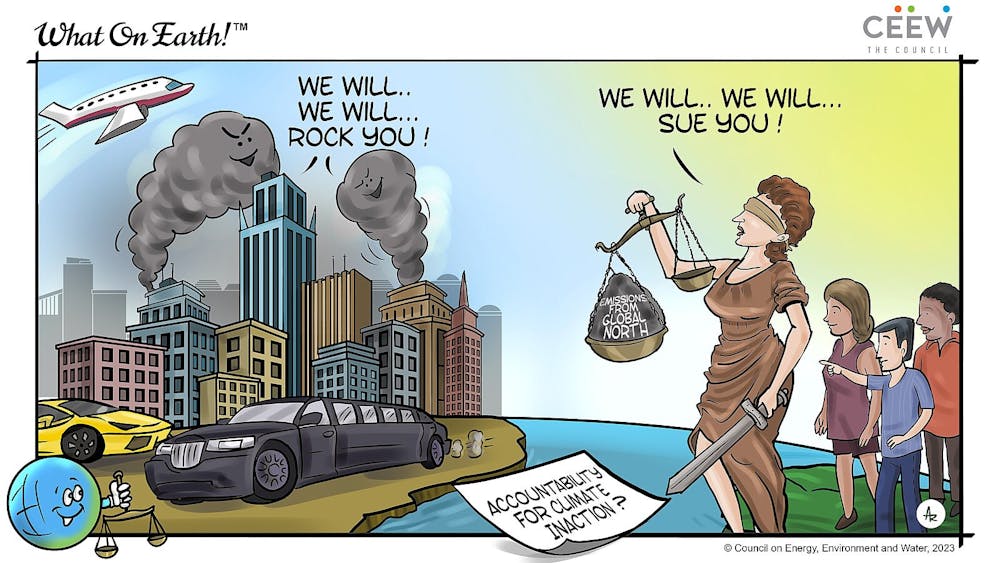By Rajika Chauhan
Staff Writer
The climate crisis has been affixed to the global consciousness and for no group more strongly than today’s youth, who have taken on the issue by leading protests and staging demonstrations. The fight has now taken an unprecedented legal footing as a group of youth activists in Portugal begin a legal challenge against 32 European governments for what they claim has been a violation to their human rights, as reported by NPR.
The six Portuguese youth have raised the case on the basis that the failure of the contested European governments to adequately address the issues of climate change or institute appropriate reforms has unlawfully deprived young people of a quality life and guarantee of future.
Reuters reports that the case is being brought forth in the European Court of Human Rights based in Strasbourg, France, and is the largest climate case of its kind to be heard in that setting. It was filed in September, 2020, against the 27 members of the E.U. and Britain, Switzerland, Norway, Russia, and Turkey.
The case is unique in its attempts to specifically tie the effects of climate change to a decline in the quality of individual lives. The ultimate goal is to hold the inaction and policy positions held by governments responsible for the progression of the climate crisis and mandate changes in action moving forward.
The six activists, ranging in age from 11 to 24, are backed by the Global Legal Action Network, based in Britain. A successful complaint could force court orders for the cutting of carbon monoxide emissions at a pace far faster than governments had originally planned for, as mentioned by AP News. The rulings of the court hold considerable leverage over the actions of member countries, with failure to comply with mandates potentially incurring heavy fines.
Lawyers representing the 32 nations are building a defense around a lack of evidence that a significant proportion of the youth have experienced any quantifiable suffering due to climate change. Reuters reports that they additionally seek to disprove the ties between the worsening impacts of climate change and any specific policies enacted by the governments under trial.
Claims are also being made from the opposition that the European Court of Human Rights does not have appropriate jurisdiction over the case, being that the pursuant are not nationals of any of the countries they are suing other than Portugal.
As profiled in NPR, the six members of the Portuguese activists include Sofia and Andre Oliviera, siblings who were first spurred to action when the 2017 wildfires in Portugal killed over a 100 people. The remaining four are all siblings and cousins, hailing from a region in central Portugal where similar wildfires are also common.
The complaints in the case include difficulties for the young activists in sleeping, concentrating or enjoying time outside during heat waves. The case is being crowdfunded by support from international nonprofits and donors.
There has been contempt on the side of the activists for what they claim is trivialization and belittlement on the part of the governments.
“I am shocked by the countries’ attempt to ignore the evidence that we’ve put in front of them, and trivialize the current state we are facing,” André Oliveira stated to AP News.
A ruling on the case is expected to be achieved by mid-2024. Until then, back and forth continues between nations who claim that adequate measures are being taken to address the impacts of climate change and youth activists who fail to see the results. For example, NPR cites the 2015 Paris Climate accord, which set a pledge to curb carbon emissions and reduce global warming, but has been severely missed by a majority of countries in the time since. Global average temperatures are expected to rise by 2 to 4 degrees Celsius by 2100.
Precedents set in similar court cases recently offer hope to the Portuguese cause. A group of Montana youth won a case this August, proving that the state’s approval of new fossil fuel projects had been neglectful of climate change. NPR reports that in 2019, the Dutch Supreme Court ruled in favor of a sustainability group, the Urgenda Foundation, finding that the emission targets set by the government were unlawful. The government responded with advanced measures, pledging to shut all coal-fired power plants by the year 2030.
The scope of this case in an international court makes it difficult to use past rulings as a predictive tool. Despite the variable outcomes, it remains a remarkable example of the transition of the activist movement beyond protest, moving into concrete strategies that seek to use institutional resources to force corrective change.







